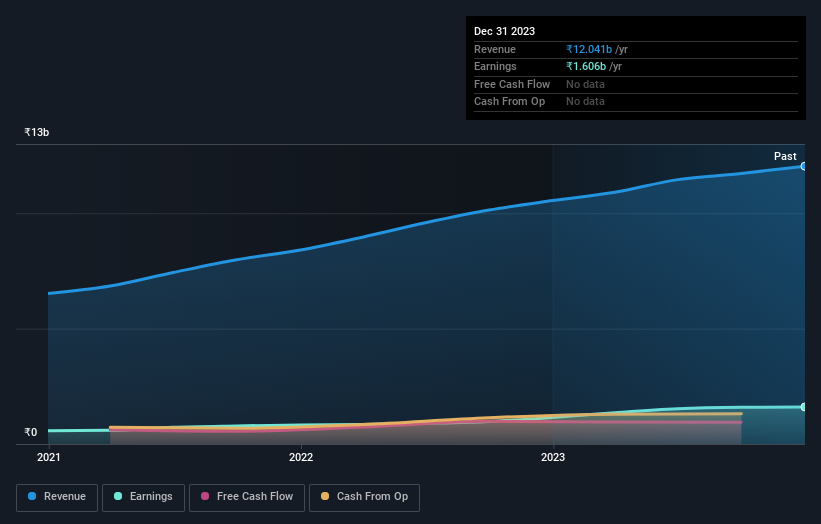Public companies who hold 74% of ESAB India Limited (NSE:ESABINDIA) gained 5.5%, institutions profited as well

Key Insights
- ESAB India's significant public companies ownership suggests that the key decisions are influenced by shareholders from the larger public
- ESAB Corporation owns 74% of the company
- Institutions own 15% of ESAB India
If you want to know who really controls ESAB India Limited (NSE:ESABINDIA), then you'll have to look at the makeup of its share registry. With 74% stake, public companies possess the maximum shares in the company. In other words, the group stands to gain the most (or lose the most) from their investment into the company.
While public companies were the group that benefitted the most from last week’s ₹4.3b market cap gain, institutions too had a 15% share in those profits.
Let's take a closer look to see what the different types of shareholders can tell us about ESAB India.
See our latest analysis for ESAB India

What Does The Institutional Ownership Tell Us About ESAB India?
Institutional investors commonly compare their own returns to the returns of a commonly followed index. So they generally do consider buying larger companies that are included in the relevant benchmark index.
We can see that ESAB India does have institutional investors; and they hold a good portion of the company's stock. This can indicate that the company has a certain degree of credibility in the investment community. However, it is best to be wary of relying on the supposed validation that comes with institutional investors. They too, get it wrong sometimes. It is not uncommon to see a big share price drop if two large institutional investors try to sell out of a stock at the same time. So it is worth checking the past earnings trajectory of ESAB India, (below). Of course, keep in mind that there are other factors to consider, too.

We note that hedge funds don't have a meaningful investment in ESAB India. ESAB Corporation is currently the largest shareholder, with 74% of shares outstanding. This essentially means that they have extensive influence, if not outright control, over the future of the corporation. With 9.8% and 2.1% of the shares outstanding respectively, SBI Funds Management Limited and Nippon Life India Asset Management Limited are the second and third largest shareholders.
While it makes sense to study institutional ownership data for a company, it also makes sense to study analyst sentiments to know which way the wind is blowing. We're not picking up on any analyst coverage of the stock at the moment, so the company is unlikely to be widely held.
Insider Ownership Of ESAB India
While the precise definition of an insider can be subjective, almost everyone considers board members to be insiders. Management ultimately answers to the board. However, it is not uncommon for managers to be executive board members, especially if they are a founder or the CEO.
Most consider insider ownership a positive because it can indicate the board is well aligned with other shareholders. However, on some occasions too much power is concentrated within this group.
Our data cannot confirm that board members are holding shares personally. Given we are not picking up on insider ownership, we may have missing data. Therefore, it would be interesting to assess the CEO compensation and tenure, here.
General Public Ownership
With a 11% ownership, the general public, mostly comprising of individual investors, have some degree of sway over ESAB India. While this group can't necessarily call the shots, it can certainly have a real influence on how the company is run.
Public Company Ownership
Public companies currently own 74% of ESAB India stock. This may be a strategic interest and the two companies may have related business interests. It could be that they have de-merged. This holding is probably worth investigating further.
Next Steps:
I find it very interesting to look at who exactly owns a company. But to truly gain insight, we need to consider other information, too. Take risks for example - ESAB India has 1 warning sign we think you should be aware of.
Of course this may not be the best stock to buy. So take a peek at this free free list of interesting companies.
NB: Figures in this article are calculated using data from the last twelve months, which refer to the 12-month period ending on the last date of the month the financial statement is dated. This may not be consistent with full year annual report figures.
Valuation is complex, but we're here to simplify it.
Discover if ESAB India might be undervalued or overvalued with our detailed analysis, featuring fair value estimates, potential risks, dividends, insider trades, and its financial condition.
Access Free AnalysisHave feedback on this article? Concerned about the content? Get in touch with us directly. Alternatively, email editorial-team (at) simplywallst.com.
This article by Simply Wall St is general in nature. We provide commentary based on historical data and analyst forecasts only using an unbiased methodology and our articles are not intended to be financial advice. It does not constitute a recommendation to buy or sell any stock, and does not take account of your objectives, or your financial situation. We aim to bring you long-term focused analysis driven by fundamental data. Note that our analysis may not factor in the latest price-sensitive company announcements or qualitative material. Simply Wall St has no position in any stocks mentioned.
About NSEI:ESABINDIA
ESAB India
Manufactures and sells welding and cutting equipment and consumables in India.
Excellent balance sheet average dividend payer.
Similar Companies
Market Insights
Community Narratives




